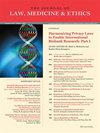循环性死亡后生命维持治疗与器官捐献的退出:立法分离的后果。
IF 1.7
4区 哲学
Q2 ETHICS
引用次数: 0
摘要
目前指导循环死亡(DCD)后撤销维持生命治疗和器官捐赠的立法存在监管空白,不利于尊重患者-捐赠者的意愿。我们描述了这些差距,它们的后果,以及修订的必要性,以防止对各方造成伤害。本文章由计算机程序翻译,如有差异,请以英文原文为准。
Withdrawal of Life-Sustaining Treatment and Organ Donation After Circulatory Death: Consequences of Legislative Separation.
Current legislation guiding withdrawal of life-sustaining treatment and organ donation after circulatory death (DCD) leaves regulatory gaps that are not optimal for honoring the wishes of patient-donors. We describe these gaps, their consequences, and the need for revision to prevent harm to all parties.
求助全文
通过发布文献求助,成功后即可免费获取论文全文。
去求助
来源期刊

Journal of Law Medicine & Ethics
医学-医学:法
CiteScore
2.90
自引率
4.80%
发文量
70
审稿时长
6-12 weeks
期刊介绍:
Material published in The Journal of Law, Medicine & Ethics (JLME) contributes to the educational mission of The American Society of Law, Medicine & Ethics, covering public health, health disparities, patient safety and quality of care, and biomedical science and research. It provides articles on such timely topics as health care quality and access, managed care, pain relief, genetics, child/maternal health, reproductive health, informed consent, assisted dying, ethics committees, HIV/AIDS, and public health. Symposium issues review significant policy developments, health law court decisions, and books.
 求助内容:
求助内容: 应助结果提醒方式:
应助结果提醒方式:


